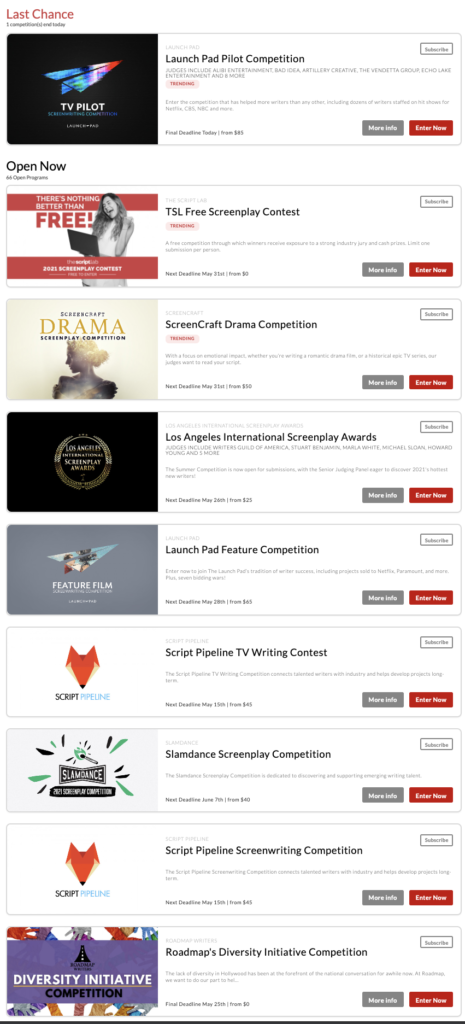
For screenwriters, one of the best ways to make inroads toward a successful and gratifying career is by participating in screenwriting competitions.
More accessible than festival labs, easier to win than most studio writing programs, and more professionally rewarding than many fellowships, screenwriting competitions have become a must for screenwriters, from novices to mid-career professionals. But doubts about what they can do, and misconceptions about what they should do abound.
What follows is a point-by-point breakdown of competitive screenwriting programs—from what you stand to gain from them and how to weed out the competitions that aren’t worth your time or money, to how to leverage wins and placements into career gains.
Set Your Expectations
There are plenty of reasons to enter screenwriting competitions, and plenty of reasons not to. For every Destin Daniel Cretton—whose career was launched when his screenplay for Short Term 12 won a prestigious Academy Nicholl Fellowship in 2010—there are hundreds of screenwriters who spend money every year waiting for a win to make it all worth it. And when a win doesn’t come, repeating the process without adjustment.
One of the biggest misconceptions about screenplay competitions could be called the “golden ticket delusion.” This is a belief premised on a misunderstanding of the way competitions work: that winning a decent competition is a magic career fix-all. As if making those connections, getting that prize money or materials package, and taking that initial flurry of industry calls will set you up for a hustle-free future. The truth is the majority of screenplay competitions simply aren’t designed to launch careers.
Cretton is a perfect case study. On paper, he went from an "unknown" filmmaker to indie darling overnight by winning the Nicholl Fellowship. In reality, by the time he entered the competition he’d already graduated from film school, interned at Nickelodeon, made a short that won the jury prize at Sundance, and signed to a manager, all of which helped him leverage that win into the career he has today.
The takeaway is not to somehow already be established before you enter competitions, but to know what you can expect to get when you do, and have plans in place to spin potential wins and placements into gold.

Destin Daniel Cretton (Credit: Jake Giles Netter)
Understand the Reality
So, what exactly should screenwriters expect to get from entering competitions? Competitions vary widely in how they stand to benefit writers. Coverfly curates unique profiles on each of its 150 qualifying competitions, including tabs on Prices & Deadlines, Benefits, and how the previous year’s winners fared. There are, broadly speaking, five types of benefits you can gain from screenwriting competitions:
Getting Representation
The best way to open doors in the industry is to get represented by a manager and/or agent. It’s amazing to see how many opportunities were invisible to you without a dedicated, well-connected industry professional by your side. After placing as a semifinalist in Final Draft’s Big Break competition, TV writer Amy Hartman signed with a literary manager at Anonymous Content and her pilot shot to the top 10% on Coverfly.
Managers and agents serve distinct purposes, so it’s important to assess what kind of partnership you want to forge and where you want it to take you. The industry-intensive ScreenCraft Fellowship has participation from all the top agencies and management firms, so screenwriters are supported at any stage in their career. Every previous Fellowship winner has signed with representation straight out of the competition, from Gersh to Zero Gravity and WME.
Other competitions, like the TITAN Awards, distribute a press release introducing you and your project to their list of industry contacts, including thousands of Hollywood agents, managers, producers, and executives.
Optioning
The most direct benefit a screenwriter could hope to gain from winning a screenplay competition is getting their script optioned for development. Though very few screenplay competitions guarantee development for winning scripts, there are exceptions. Winning the Narrative Feature Competition at the annual Austin Film Festival Writer’s Conference, for example, gets you a first look distribution deal with Gravitas Ventures.
But in general, look for clues related to how connected a competition is to the industry, who makes up their jury, and how hard they promote their finalists. These all increase the chances that post-win/placement buzz can be leveraged into a deal.
Mentorship
Screenwriters can certainly be diligent about learning the craft, as well as the ins and outs of the industry, but acquiring that knowledge just hits different when you get it from a mentor. Competitions that feature mentorship opportunities with industry professionals, from notable screenwriters to development executives, give you the chance to work on your current project with someone who not only knows what they're talking about but who is also uniquely engaged with your work.
There are a number of competitions that do this. Shore Scripts, which offers mentorship to its Feature, TV Pilot, and Short Film Fund winners, helps writers create a portfolio piece to support their career development. ScreenCraft's optional add-on prize category, "ScreenCraft First Look Bootcamp," gives writers a chance to strengthen their projects with guidance from an industry professional.
Making Social Connections
Unlike virtually every other part of the filmmaking process, screenwriting requires quiet and solitude. You don’t have the luxury of networking all day on set while doing your job. Participating in screenplay competitions is a great way to expand your circle. Stowe Story Labs offer five unique writers’ retreats and narrative labs each year in which peer-to-peer development sessions, mentoring programs, meals, and rest times are all done in close community. Another great example of the retreat model, CineStory Foundation’s 12-month Feature Retreat, launched Mark Fergus and Hawk Ostby into an Academy Award nomination for their screenplay for Children of Men.
Beyond workshops, events like the Slamdance Film Festival and Cinequest Film Festival allow writers to meet in real life and make connections that could last a lifetime.
Receiving Feedback
Getting impartial feedback from fresh eyes can be an integral part of developing the ideas in your script. And you might find that many writers submit to screenplay competitions specifically for the feedback they provide.
Notes will mostly address the meat and potatoes of your screenplay—what does it say? How does it say it? Does it say it in the most effective or creative way possible? The Finish Line Script Competition employs a unique setup in which finalists receive comprehensive notes from a script consultant that they are asked to implement into the screenplay and resubmit before a winner is chosen. And WeScreenplay's contests all provide free notes with every submission.
Funding & Production Assistance
Lots of screenplay competitions simply offer a ton of cash prizes. The Academy Nicholl Fellowship, which has transformed many an aspirant duckling into beautiful, employable screenwriting swans, awards up to $35,000 cash for its top winner.
Cash isn’t necessarily king in this department. Whether it's a tech bundle or an intro to a potential financier, production assistance is key for those who are ready to dive head first into production. Brit Cowan, who won the WeScreenplay Feature Contest in 2019, signed a shopping agreement with an independent producer after being connected through Coverfly.
How Does the Industry Use Competitions?
The democratic, merit-based approach to talent discovery practiced in screenplay competitions has displaced many of the industry’s traditional, inaccessible approaches to recruiting writers (i.e., Executive A knows a guy who knows a guy who has a script). That hasn’t just been good for writers, it's been good for the industry, too.
Coverfly has granted managers, producers, literary agents, and scouts access to a whole new database of burgeoning talent. With all the data centralized in one place, from genre, format, demographics, competition history, and average project score, recruiters can forego many of the meetings and phone calls it used to take to just get a script in front of them. Screenwriter profiles and submission/placement tracking are like a Fitbit and portfolio wrapped into one.
How to Find the Right Competitions to Enter
As with all things, the moment it was clear there was money to be made off of screenplay competitions, a flood of legitimate, half-legit, and scammy operations descended upon the industry. It can be challenging for writers to tell what’s worth their time and what isn't. Determining which competitions are worth the entry fee is a two-step process: verifying that the competition is legitimate, and determining if it suits your particular needs. That's a problem Coverfly solves.
Is the Competition Legit?
From a pool of hundreds, Coverfly has whittled the field down to about 150 qualifying competitions. From intensive in-person workshop boot camps like the CineStory Feature Retreat to the bevy of genre-specific online competitions ScreenCraft offers every year, Coverfly only gives its stamp of approval to competitions that score high enough marks in the following four criteria:
- Demonstrated Track Record of Success: Most decent competitions will have a page on their website for “success stories”—testimonials from alumni who demonstrably benefitted from the competition experience. It’s simple: if you want to get representation out of a competition, for example, you should be able to confirm that past participants have done the same. The information should be clear and able to be cross referenced with a cursory Google search. Don’t trust vague language like “X competitor’s pilot sold to a television studio.” Which television studio? For how much? How long ago did this happen?
 Transparency: The basic information should be crystal clear. When do submission dates open? When will you hear back? Will you be receiving feedback? Who are the judges? Coverfly not only requires that all programs provide this information but they also present it in a streamlined fashion on each competition’s unique page.
Transparency: The basic information should be crystal clear. When do submission dates open? When will you hear back? Will you be receiving feedback? Who are the judges? Coverfly not only requires that all programs provide this information but they also present it in a streamlined fashion on each competition’s unique page.- Communication: Competitions that communicate with participants throughout the selection process will advertise the fact that they do so because it’s unfortunately not an industry standard. The sit-and-wait game is agonizing and unfulfilling, ultimately lending itself to the cynical, suspicious view many screenwriters have of competitions. Even if a competition doesn’t send out progress reports, Coverfly has a tool that tracks your script’s progress through the competition.
- Programming, Prizes, Juries: In short, Coverfly looks for competitions that can boast prestigious juries, fabulous prize packages, and who can prove their winners actually receive what’s promised. We look beyond the marketing language to understand what kind of niche a particular program fits and how it might help writers at specific stages in their careers.
Is the Competition Right for Me?
This is all about understanding yourself. Are you mid-career or early career? Do you want to write big, Hollywood, Altman-esque ensemble dramas, or do you want to write microbudget horror films that would be at home in a Hulu x Blumhouse development deal? Are you looking to get a script off your hands via an auction, or do you want to attach yourself as a writer with an interested studio in the event of financing?
Screenwriting competitive programs aren’t going to say on their homepage the exact type of writer they’re best suited for; they want to appeal to as many qualified candidates as possible. You need to learn to read between the lines. Know where you are, what would best propel you up the next rung of the ladder, and match that as best you can to what competitions offer.
What Can You Do to Leverage a Placement?
You’ve finished your screenplay, you’ve submitted it to a batch of suitable competitions, and you’re waiting to hear how it fares. Even before you get the results, you should be thinking proactively about how you can leverage potential placements. By and large, your circumstances aren’t going to change from just having won some cash, taken some meetings, or enjoyed a few days of mentions on Twitter. Whatever buzz lands in your lap, you need to fashion it by hand into tangible opportunities.
Raise the temperature of the heat around you to a fever pitch. Reach out to contacts to tell them about progress updates, post about placements on social media, even list them on LinkedIn. You never know what connection of a connection is going to be instrumental in getting your work off the ground, and you’ll be surprised by the platforms that people will discover you on. It’s not all about Twitter.
Organization and accountability are key to the period of intense interest that follows a win/placement. Keep a spreadsheet of who called, where they work, what you discussed, and what opportunities could come out of it. Develop a follow-up calendar. Circle back 3 weeks after each call—if you’re too quick, you’ll burn through your contacts, but if you don’t follow up, those connections will dry up. Prioritize this list not by what you want the most, but by what you think you have the best shot at getting.
Screenplay competitions are a radically fair and accessible intervention into the old, insider’s model of talent discovery. In part, they’re a spin of the wheel of fortune. But more so, they’re just another challenge that takes a particular set of skills to understand. The bottom line is to be proactive. Wins, placements, and even participation can and have transformed careers. But at the end of the day, whatever doors a competition can open for you, you still have to walk into the room fully prepared to sell your story.

